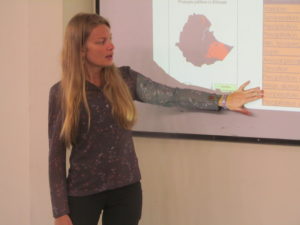Meet Dr. Amanda West! A former NASA DEVELOP National Program participant, Center Lead, and current mentor to the program. She is currently a Postdoctoral Fellow in ecology. Read on to discover her path to a career in the Earth sciences.

How did you discover your passion for Earth Science?
As a child I was always very curious about the Earth and how organisms interact. Earth Science has been an intrinsic passion for me for as long as I can remember, therefore it is hard to pinpoint a discovery moment.
Where do you work and do you remember what it was like on your first day of work?
I am currently employed as a Postdoctoral Fellow at the Natural Resource Ecology Laboratory, Colorado State University. On my first day of work, I felt astounded that I was no longer a student and realized that I was truly following my passion for research and teaching.
What do you enjoy most about what you do?
I enjoy the diversity of research and teaching projects that I am involved in. It is never monotonous!
What inspired you to work in this field?
My passion for observing and increasing our understanding of the Earth and promoting conservation.
What are some of the most important lessons you have learned in your life?
Never take time for granted – Gandhi is quoted: “Live as if you were to die tomorrow, learn as if you were to live forever”. Always be true to yourself. Embrace and share gratitude.
What do you consider your greatest accomplishment?
Earning a PhD in Ecology.
What was the most difficult moment of your career? What did you learn?
During a former career, I had to follow a regulation that did not agree with my values. From this experience, I learned that it is important to always consider the perspective of other interested parties despite what I consider may consider fair and rational.
Who has been the biggest influence on your life, and what lessons did they teach you?
My father, who told me to be true to myself and never let anyone convince me otherwise.
How has your career been different than what you’d imagined?
My current career falls more in line with what I imagined when I started graduate school. A former career that I had between my MS and PhD programs was not what I imagined or desired (and this led to my pursuit of a PhD).
Did you have to overcome any gender barriers in your career?
Yes; a couple of examples in a former career were the notions that I could not conduct the same type of field work as male colleagues or drive a truck pulling a trailer or boat (these were quickly disproven by my actions!). I have also had to overcome name calling related to gender both in and out of work, which I addressed promptly by telling each respective individual that this behavior is inappropriate.
What does your future hold?
I want to continue research and teaching in remote sensing and geospatial modeling, to promote conservation of natural resources.
What one piece of advice would you like to pass on to the next generation?
Pursue your passion, and trust what follows.
